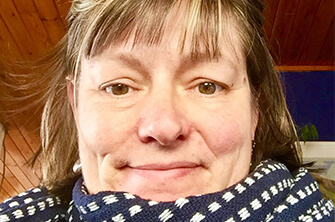My son Alfie turns 18 this year. He has Down syndrome and is autistic, a complex mix. At age 12, he was also diagnosed with Sensory Processing Disorder. From the day of that diagnosis, my family’s lives changed and it has become a mission of mine to make more people aware of this condition in the hope that diagnosis and specialist support can help others as much as it has helped us.
My name is Kate. I work for Dimensions as an Associate Family Consultant, supporting families to get what they need from the organisation, representing their views at all levels of the organisation, and hopefully playing my part in driving up standards. As Alfie enters adulthood, I hope he will become supported by Dimensions.
We suspected that Alfie had autism from around 2 years when he started to develop repetitive play – he would roll his toy cars and trains on a shelf across in front of his eyes. Although at that time the professionals disagreed, when he arrived at school, they were happy to implement autism strategies with Alfie. We finally got Alfie’s autism diagnosis when he was 11.
Alfie has always had trouble dealing with loud noise, busy environments and depth perception (for example navigating steps and thresholds.) He also perceived light touch painfully; if you lightly brushed his skin, he reacted like he had been cut – leading him to be hypervigilant about being touched. He found queuing at school really hard. And assembly was a no go!
Independently of this, we had been accessing specialist SALT provision from Symbol UK who recommended a Sensory Integration Assessment at the Sensory Smart Child Clinic in Walton on Thames. The diagnosis was of Significant Sensory Processing Disorder. A programme – or ‘diet’ as they term it – was devised to help Alfie regulate his sensory system.
It has been the most enormously successful life changing intervention.
It turns out Alfie lacked auditory ‘depth perception.’ He couldn’t tell where sound comes from, whether it is distant or close by. And his perception of touch was very different – he perceived light touch painfully, but needed extra firm touch for hugs etc. to get enough reassurance. Through his fear of distressing sudden noises and touch he became increasingly defensive and anxious – constantly in fight or flight mode.
The clinic prescribed a programme of listening to digitally modified music to help Alfie’s brain develop ‘depth perception’ of sound. He can now identify where sounds are coming from, and is now ok with most sounds, (barring fireworks and thunder).
Alfie’s touch sensitivity was tackled equally successfully through an intensive programme of brushing the skin with a specially designed brush, together with weighted blankets at night. Best of all, big hugs are now less bone crunching!
Alfie’s stress and anxiety have come down tremendously – meaning he can pay more attention, join in conversations, be more relaxed around other people, be more open to learning, sleep better, spend more time on his own, and all the other long term health improvements associated from being free from continual trauma.
I’m evangelical about Sensory Integration Therapy. By helping Alfie manage his previously unbearable environment, this therapy has massively helped Alfie’s anxiety and helped us see why he was behaving so defensively. I’m lobbying to get it commissioned and implemented for children in Suffolk and hopefully, eventually, nationally.
It may, or may not be right for your family. But if these words strike a chord, feel free to get in touch. kate.chate@dimensions-uk.org
